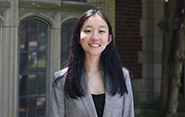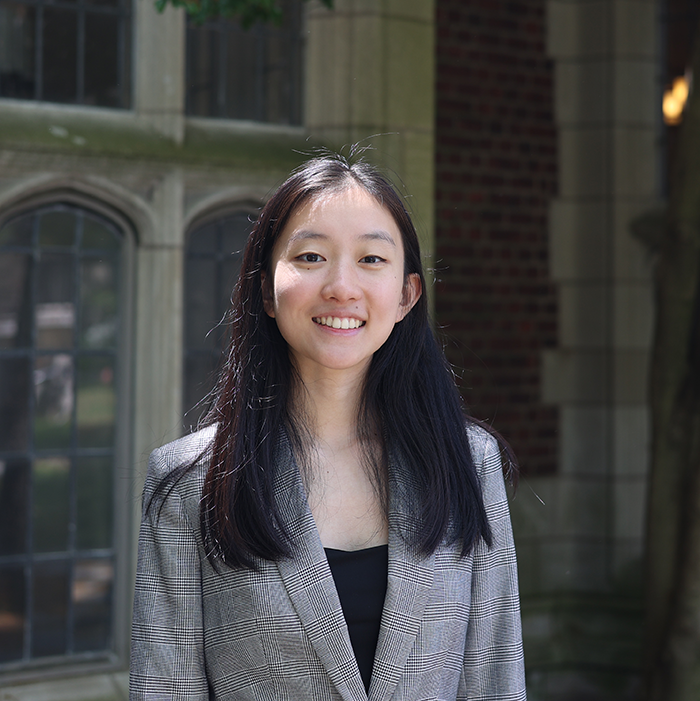Jenny Mao '24: from Yale to SpaceX

Graduating senior Jenny Mao, from San Mateo, California, has made the most of her time at Yale. Among numerous other honors, the Computer Science major has won the Yale Science and Engineering Award for Outstanding Undergraduate Achievement and was named a Michele Dufault Scholar. She was co-captain of the Figure Skating Club, project leader for the e-NABLE student club, and a counselor at Camp Kesem. With the theme “Oh, the Places You’ll Go,” she gave tours that explored art through migration and motion as a gallery guide at the Yale University Art Gallery. With guidance from her senior thesis advisor, Professor Y. Richard Yang, she worked with CERN to improve its File Transfer Service Optimizer algorithm.
After graduation, she’ll intern as a Disney Imagineer and then start her new job at SpaceX, where she’ll work on Starlink, the satellite Internet constellation.
 How would you describe your time at Yale?
How would you describe your time at Yale?
Yale has been an incredible space for me to chase my curiosities. I am very interested in computer science, biology, and art history. Through my classes, clubs, and rabbit-hole conversations with friends, I feel like I’ve gotten closer to the heart of the questions that are exciting to me in those fields. My friends and I like to joke that our classes in different fields tend to end up converging around the same central questions.
What was the connection?
In computer science, I'm interested in knowing how a material like silicon can hold memory and essentially think. Right now, in my computer architecture class, there are some really cool questions about cache coherence, like how we can get different parts of your computer to remember and forget the correct pieces of memory. And if you think about the human brain, you don't really have conscious control over what you choose to forget. You have layers of abstraction built in over these biological processes. But when you build a computer, you have to design those things from the ground up. These questions come up over and over again. Another example is that I am working on building a haptic glove, where I’m interested in replicating the sensation of holding something in your hand even if it only exists virtually. How can you simulate experiences like the textures of velvet or stone? I love chasing down all these questions to try and understand how magical things like computers or our sense of touch work down to the cellular level.
You made prosthetics with the student group e-NABLE?
Oh, yeah, I love this club. We work with kids in the New Haven area who want prosthetics, usually for a specific function, and we offer them for free. This is really important because kids outgrow their prosthetics very quickly, and it's pretty expensive to get them replaced. The one that I've spent the most time on is a device that we call the Forklift, and it's designed for a teenager who has Duchenne muscular dystrophy. He wants to be able to eat independently but doesn't have the muscle strength to lift his arm from the plate to his mouth. So this is a simple robotic arm, which fits like an exoskeleton around his own arm. It helps him lift, and he can control it with touch sensors using his other hand, giving him more autonomy and mobility. It's been a really lovely experience to work with him and the e-NABLE team to bring this idea to life.
You were co-captain of the figure skating club.
The Whale was one of the first spaces available to me in COVID year. It was a semester where all our classes were online, but luckily, they still opened the ice rink, so I went there a lot because it was very familiar to home. My co-captains and I worked hard to grow the club and get back to the programs that had halted during the pandemic. One that I’m really happy about is we re-started an after-school skating program for kids at Wexler Grant [a K-8 school in New Haven]. That was one of my goals from the beginning, as it was a chance for us to work with kids and pass on the joy of skating. It’s so fun to watch them gain confidence on the ice. They are so speedy and brave!
What did you do as a counselor for Camp Kesem?
Camp Kesem, which more people should know about, is a camp for kids who have a parent who has cancer. It's a free one-week summer camp, and provides a community of support for those kids year round. Camp is a whirlwind of grief, hugs, dino nugget lunches, and friendship bracelets. Over the past few years, I’ve witnessed my campers go from just meeting each other to becoming best friends, which feels really special. You really get to see all the little and big ways that people care for each other.
Any advice for incoming students?
I think my first piece of advice is to read The Power of Patience written by Jennifer Roberts. It’s one of my favorite readings from college. She talks about sitting in front of a painting for three hours, and the important practice of deceleration and sustained attention, which is useful for just about anything you want to do. And then my second piece of advice is, you can't win them all, so you have to prioritize to get something done.

